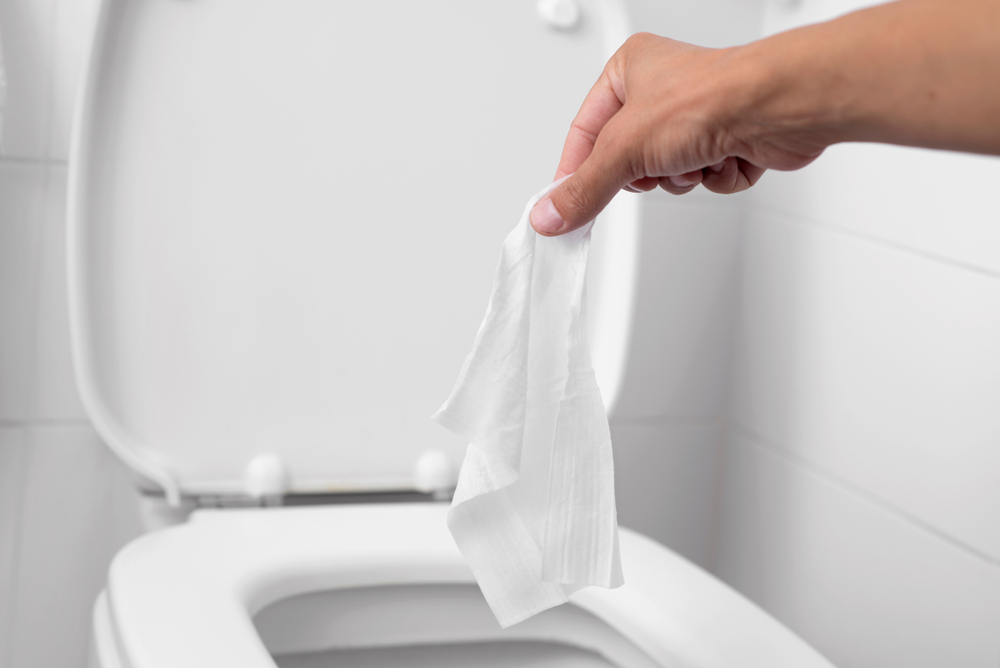If you treat your home toilets like trash receptacles, you’re eventually going to require septic system repair that was entirely preventable. When dealing with waste and toilets, you should only ever flush pee, poo, and toilet paper down them!
If you’re asking yourself, “But I thought flushable wipes were okay to flush down the toilet?” and it’s not one of the three previously mentioned safe-to-flush items, don’t worry; you’re not alone. Many folks are unaware that many of the everyday items we’ll be identifying in today’s blog are big no-no’s when it comes to their toilets.
Read on to learn why disposing of these items in your toilet could end up creating costly plumbing problems.
1. Flushable Wipes
There’s never been a bigger misnomer than “flushable” wipes. These wipes should never go down your toilet. They don’t break down quickly and easily get stuck in drains and cause blockages, resulting in sewage backups.
2. Dental Floss
Don’t flush dental floss because it’s usually made of Teflon or nylon—synthetic materials that don’t break down in water. When flushed down your toilet, dental floss can wrap around other items creating large obstructions that can clog pipes and sewer systems and make matters worse.
3. Hair
Much like dental floss, flushing hair—from humans or pets—down your toilet can often cause larger issues down the line. Besides wrapping around other items and creating blockages in your pipes and sewers, hair also sticks to pipes.
4. Feminine Products
You should never flush tampons, sanitary pads, and other feminine products. Since they’re designed to absorb liquid—and, in some cases, expand in size—they can rapidly obstruct your pipes.
5. Nail Clippings
While you might not see the same impact as you might with, say, flushable wipes, you should still avoid flushing nail clippings down the toilet. This organic material doesn’t break down in water.
6. Cat Litter
Animal waste is not the same as human waste, and you shouldn’t flush it down the toilet. What’s more, cat waste also has the potential to introduce parasites, such as Toxoplasma gondii, into the water supply. Additionally, the litter itself can absorb toilet water and clog pipes.
7. Food
While you might think that it’s safe to flush food down the toilet—after all, human waste is essentially just broken-down food—doing so can cause real problems for your plumbing. Yes, food is biodegradable and will eventually break down. But food can cause clogs until that happens.
8. Contact Lenses
While many contact lenses are disposable, that doesn’t mean they’re biodegradable. Tiny plastics do not belong in our water systems. Discarding used lenses down the drain or toilet contributes to creating trillions of microplastics, polluting waterways.
9. Paper Towels
Never substitute paper towels (or facial tissues) for when you’ve run out of toilet paper. While they may look and feel like toilet paper, they do not disintegrate easily in your septic tank.
10. Makeup Wipes
Put makeup wipes in the garbage, even if they say they’re flushable. Cosmetic wipes do not dissolve in water and harm the sewage treatment process.
11. Cotton Products
Cotton products such as swabs, balls, and pads, are not safe to flush. Cotton products don’t break down the way toilet paper does, and all they do is bind together. This leads to problems in your pipes down the line.
12. Chewing Gum
Flushing chewing gum down your toilet is a big no-no. Gum is a bit like glue in that it’s a sticky and insoluble substance. Gum will never disintegrate and just lead to potential pipe blockages.
13. Bleach
This one might surprise you, but you shouldn’t be pouring bleach down your toilet drain. Bleach is corrosive and damaging to your toilet and septic system. Bleach can potentially create toxic fumes when it reacts with other substances in your plumbing.
14. Cooking Grease
Cooking grease is fat, and when it solidifies, it becomes hard as a rock—this has the potential to wreck your plumbing system. Save yourself the trouble and never flush cooking grease down your toilet or other drains.
15. Paint & Other Chemicals
Don’t pour any kind of paint, unwanted solvents, or other chemicals used around the home down the toilet. Paint can harden and constrict the plumbing pipes, and these chemicals don’t belong in the water supply.
16. Tobacco Products
Many folks mistakenly believe it’s okay to flush cigarette butts or other tobacco products down the toilet. It’s not. Cigarette butts and other tobacco products can clog your pipes. Tobacco products are full of dangerous chemicals, toxins, and carcinogens that leach into and contaminate the water supply.
17. Medicine & Pharmaceuticals
While a flush down the toilet may seem like a safe and easy way to get rid of your medication—it’s not. Expired medication or recently used pharmaceuticals dissolve in your plumbing’s water and contaminate groundwater.
For even more items to avoid flushing down your toilet, check out our newest blog post!
Have you been accidentally flushing the wrong items down your toilet?
If you’ve got a clog or a backup and you’re looking for 24-hour septic service, Biros Septic & Drain Cleaning can help you!
Are you looking for emergency residential septic tank service, septic system installation service, or do you need septic tank pumping in Scranton, PA? At Biros, we provide septic tank cleaning services using the latest, state-of-the-art equipment. This cutting-edge gear includes rooters, high-pressure water jets, and cameras, which we use to unclog any blockages in your septic systems and to ensure your drain lines are open and flowing at maximum efficiency. We’ll get your system working again!
If you have any additional septic tank questions, want to learn more about our professional septic service, or schedule your septic system service—contact us today!

